Sberbank of Russia
Coordinates: 55°41′55.69″N 37°34′45.54″E / 55.6988028°N 37.5793167°E
 | |
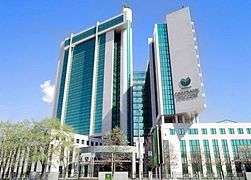 | |
| Public (PAO) | |
| Traded as | MCX: SBER |
| Industry | Banking, Financial Services |
| Founded | 1841 |
| Headquarters | Moscow, Russia |
Key people |
Sergey Ignatiev (Chairman of the Supervisory Board) Herman Gref (CEO, Chairman of the Executive Board) |
| Products | consumer banking, corporate banking, finance and insurance, investment banking, mortgage loans, private banking, private equity, savings, Securities, asset management, wealth management, Credit cards |
| RUB 1300.7 billion (2014) | |
| RUB 290.3 billion (2014) | |
| Total assets | RUB 25.201 trillion (2014) [1] |
| Owner | Central Bank of Russia (51%) |
Number of employees | over 325,000 [2] |
| Subsidiaries |
Sberbank CIB Denizbank Subsidiaries in various European and post-Soviet countries |
| Rating | Ba2 (Moody's), BBB- (Fitch) (2017)[3] |
| Website |
www |
Sberbank (Sberbank, Russian: Сбербанк, initially a contraction of "сберегательный банк" - sbieriegatielny bank; English: "Savings bank") is a state-owned Russian banking and financial services company headquartered in Moscow. The company was known as "Sberbank of Russia" until 2015. Sberbank has operations in several European and post-Soviet countries. As of 2014 it was the largest bank in Russia and Eastern Europe, and the third largest in Europe, ranked 33rd in the world and first in central and Eastern Europe in The Banker's Top 1000 World Banks ranking.[4]
History

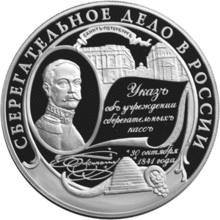
Early history
Sberbank's history goes back to Cancrin's financial reform of 1841,[5] when a network of the first state-owned savings banks was created in Russia. By the end of the 19th century, the network reached almost 4 thousand outlets with over 2 million depositors.[6]
Since 1905, savings bank outlets became authorised to sell insurance. After 1910, savings banks started subsidising credit cooperation institutions and extending loans to small lenders. In 1915, savings bank outlets started accepting government securities for depositing.[7]
Soviet savings banks system
After the October Revolution of 1917, the state savings banks system continued its activity and growth under the management of the Finance Ministry of the USSR as the State Labour Savings Banks System. From 1926, the saving bank outlets were used to pay wages to blue- and white-collar workers. The savings banks were used to distribute state lottery tickets and for the placement of state bonds with the population. The savings banks introduced wider services such as money transfers.[8]
By late 1980s, the Soviet savings bank system had almost 80 thousand branches. As part of Perestroika reforms, in 1987 the savings bank outlets are reorganised into the Savings Bank of the USSR. Within the Savings bank of the USSR,[9] separate savings banks were created in the Soviet Republics. Following the dissolution of the USSR, the former republican savings banks became state savings banks of the newly independent post-Soviet states.
In 1991, the Savings bank of the RSFSR has been reorganised into the Joint-Stock Commercial Savings Bank of the Russian Federation (Sberbank of Russia).
Sberbank of Russia
In post-Soviet Russia, Sberbank is the largest universal bank despite growing competition from private and other state-owned commercial banks. The bank has gradually expanded its international presence.[10]
Since 2007, Sberbank is led by former economy minister Herman Gref.[11]
Volksbank International acquisition, 2011
In 2011, Sberbank acquired Volksbank International AG from its shareholders Österreichische Volksbanken AG, BPCE, DZ Bank and WGZ Bank. The deal included all VBI assets - banks in Slovakia, Czech Republic, Hungary, Slovenia, Croatia, Ukraine, Serbia and Bosnia and Herzegovina, except for Volksbank Romania. The agreed price was €585 to €645 million, depending on VBI business performance in 2011. VBI’s total assets excluding Romania was €9.4 billion in June 2011.[12]
Denizbank acquisition, 2012
In June 2012 Sberbank bought the Turkish DenizBank for Turkish Lira 6,469 billion (about EUR 2,821 billion or US$3.504 billion) from the lender Dexia, which in 2011 was "partly nationalized by the governments of France, Belgium and Luxembourg".[13] The deal included DenizBank subsidiaries in Turkey, Austria and Russia.[14]
US and EU sanctions, 2014
After the annexation of the Crimean Peninsula by Russia in 2014 the Obama administration imposed sanctions, to which the US Department of Treasury added new prohibitions in September 2014, coinciding with EU sanctions.[15] Sanctions consist of access restriction to the EU and US capital markets.[16][17][18] After announcement of the sanctions, and by the end of July, Sberbank's market value had dropped the most market value among the world’s major lenders plus investors moved $22 billion from Sberbank’s market capitalization.[19] Still, during the following year Sberbank’s share price grew back 89%.[20] Sberbank together with other Russian banks filed claims with the highest EU court to lift the punitive economic measures.[21]
Ownership
The majority shareholder of Sberbank is the Central Bank of the Russian Federation, owning 50%+1 voting share of Sberbank's voting shares. The rest of the shares is dispersed among portfolio, private and other investors with an estimated shareholding of over 43% held by foreigners.[22]
Russia's central bank cannot sell its stake without a change in Russia's laws.[23][24]
Management
The President and Chief Executive Officer is Herman Gref, confirmed by the Board of Directors on 16 October 2007.
The Chairman of the Supervisory Board of Sberbank is Sergey Ignatiev, former Chairman of the Central Bank of the Russian Federation.
Operations
As of 2015 the bank had about 16,500 offices with over 250,000 employees.[25] According to own estimates, the bank had over 137 million retail clients and over 1.1 million corporate clients in its 22 countries of presence.
As of August 2015 it accounted for 28.6% of aggregate banking assets, calling itself "the circulatory system of the Russian economy","key lender to the Russian economy and the biggest receiver of deposits".[25]
Within Russia, Sberbank is structured into several regional divisions (territorial banks):
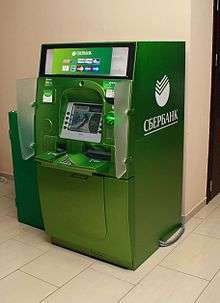
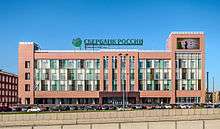
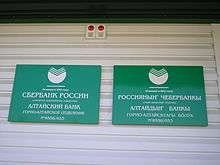
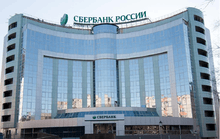
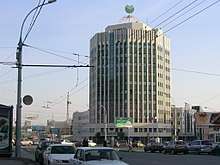
.jpg)
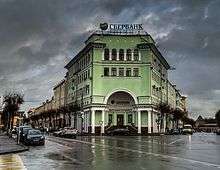
International presence
| | BPS Sberbank |
| | Sberbank[26] |
| | Sberbank Europe |
| | DenizBank |
| | Sberbank Europe |
| | Sberbank Europe |
| | Sberbank Europe |
| | Sberbank Europe |
| | Sberbank Europe |
| | Sberbank Europe |
| | Sberbank Switzerland |
| | Sberbank Europe |
| | Sberbank Europe |
| | Sberbank Europe |
| | Sberbank International |
| | Sberbank International |
| Sberbank CIB | |
| Sberbank CIB | |
| Sberbank CIB |
In March 2017 Ukraine imposed sanctions on Sberbank (and other Russian state-owned banks operating in Ukraine) as part of its continued sanctions on Russia for its annexation of Crimea and involvement in the War in Donbass.[27] Since then the bank is trying to sell its Ukrainian subsidiary; as of August 2017 it has not been able to do so.[27]
Sponsorship
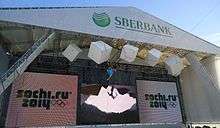
Sberbank sponsors sports and charity events in various regions of Russia,[28][29][30][31] as well as educational projects[32][33] including projects developing financial literacy.[34][35]
Criticism
Not returning of citizens' deposits
Sberbank is the successor of Soviet saving banks, whose assets belonged to the state.[36] During Russia's transition to a market economy in the 1990s, in which these assets were sold, Sberbank provided no guarantee for citizens' deposits.[37] This resulted in a landslide depreciation, which in turn led to severe discontent among the Russian population.[38] Since 1996, partial compensation for investors' losses has been offered[39] - however, it must be noted that this only applied to state-owned banks such as Sberbank until 2003, offering them an unfair advantage.[40]
Low level of service
In the 2000 Sberbank was repeatedly blamed for poor service.[41][42] Consequently, in subsequent years, Sberbank has introduced new services[43][44] and improved the quality of some of its existing ones. By the mid-2010s, the bank was reportedly among the market leaders with regards to quality of client services, such as services for retail depositors,[45] premium services[46] and several others.
Ukrainian accusation of funding for terrorism in Ukraine
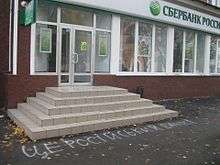
In April 2014, several Ukrainian officials accused Sberbank of funding actions which took place in the East and South of Ukraine, including terrorism. The bank denied any involvement in the financing of illegal activities on Ukrainian territory, which was later confirmed by an examination carried out by the National Bank of Ukraine.[47]
In late 2013 and early 2014 the bank's network had become a target of the Do not buy Russian goods! campaign. Ukrainian activists appealed not to use Sberbank's services because of their Russian origin. The boycott had become widespread in March 2014 in connection with the Crimean crisis and 2014 Russian military intervention in Ukraine with a wave of protest actions against Russian banks in Ukraine, and against Sberbank in particular. Banks were vandalized in particular after the accusations of funding of terrorism in Ukraine.
March 2017 Ukraine imposed sanctions on Sberbank (and other Russian state-owned banks operating in Ukraine) as part of its continued sanctions on Russia for its annexation of Crimea and involvement in the War in Donbass.[27] Since then the bank is Ukrainian subsidiary is on sale.[27] But as of August 2017 it has been unsuccessfully trying to sell the asset after the National Bank of Ukraine blocked the sale of the bank due to a "failure to provide the necessary and sufficient documents to carry out checks on the investors in compliance with Ukrainian law."[27]
See also
References
- ↑ "Sberbank of Russia - Key data". Sberbank.ru. Retrieved 2015-11-06.
- ↑ "Sberbank of Russia - About Sberbank". Sberbank.ru. Retrieved 2016-10-06.
- ↑ "Рейтинг банков - 2017 (таблица)". Forbes.ru. 23 March 2017. Retrieved 1 May 2017.
- ↑ "Top 1000 World Banks – Sales bring changes in CEE but Russia still rules". The Banker. 30 June 2014. Retrieved 11 October 2014.
- ↑ "Sberbank of Russia - About Sberbank". Sbrf.ru. 2013-11-01. Retrieved 2014-03-21.
- ↑ "1895-1917". Sberbank.ru. Retrieved 6 October 2015.
- ↑ "Sberbank of Russia - 1895-1917". Sberbank.ru. Retrieved 2014-11-06.
- ↑ "Sberbank of Russia - 1917-1941". Sberbank.ru. Retrieved 2014-11-06.
- ↑ "Sberbank of Russia - 1953-1993". Sberbank.ru. Retrieved 2014-11-06.
- ↑ "Sberbank of Russia - 1991-2008". Sberbank.ru. Retrieved 2014-11-06.
- ↑ "Top 1000 World Banks – Sales bring changes in CEE but Russia still rules". Reuters. 29 May 2015. Retrieved 6 November 2015.
- ↑ "Sberbank completes Volksbank buy". Russian Times. 2011-09-09. Retrieved 2014-03-21.
- ↑ Kramer, Andrew (8 June 2012). "Sberbank of Russia to Buy DenizBank for $3.5 Billion". NYT. New York Times. Retrieved 12 September 2014.
- ↑ "Sberbank Announces Agreement to Acquire 99.85% of DenizBank". 8 June 2012. Retrieved 11 November 2015.
- ↑ Arshad Mohammed; Bill Trott (12 September 2014). "U.S. steps up sanctions on Russia over Ukraine". Reuters. Retrieved 12 September 2014.
- ↑ "US Slams Russia With Punishing New Sanctions". Business Insider. 12 September 2014. Retrieved 10 November 2015.
- ↑ "Obama team unveils new Russia sanctions". USA Today. 12 September 2014. Retrieved 10 November 2015.
- ↑ "Sweeping new US and EU sanctions target Russia's banks and oil companies". the guardian. 12 September 2014. Retrieved 10 November 2015.
- ↑ Halia Pavliva (28 July 2014). "Sberbank Drops as EU Sanctions on Russian Lenders Loom". Bloomberg News. Bloomberg L.P. Retrieved 14 November 2014.
- ↑ Elena Popina (6 December 2015). "Sberbank Rally Seen Fading as Russia-Turkey Rift Increases Risk". Bloomberg News. Bloomberg L.P. Retrieved 11 December 2015.
- ↑ "‘EU in court!’ Biggest Russian lender Sberbank launches sanctions appeal". RT. Autonomous Nonprofit Organization “TV-Novosti”. 24 October 2014. Retrieved 11 December 2015.
- ↑ Shareholder Structure
- ↑ "Федеральный закон от 10.07.2002 N 86-ФЗ (ред. от 05.10.2015) "О Центральном банке Российской Федерации (Банке России)"". КонсультантПлюс. Retrieved 11 November 2015.
- ↑ "Сбербанк могут продать без закона". Газета Коммерсантъ. Retrieved 11 November 2015.
- 1 2 "Sberbank – About Us". Sberbank.ru. Retrieved 9 November 2015.
- ↑ "«Сбербанк»". www.sberbank.kz. Retrieved 2017-06-02.
- 1 2 3 4 5 Ukraine blocks sale of subsidiaries of Russia's Sberbank, VEB – media, UNIAN (29 July 2017)
- ↑ "Поволжский банк проводит донорский марафон "СБЕРегая тепло сердец"". Коммерсант.ру. Retrieved 2015-11-11.
- ↑ "Собрать детей в школу помогли сотрудники Западно-Уральского банка Сбербанка России". Bankir.ru. Retrieved 2015-11-11.
- ↑ "42 города вышли на старт национального забега Сбербанка". Lenta.ru. Retrieved 2015-11-11.
- ↑ "Сбербанк предоставил льготные условия обслуживания благотворительным организациям". Bankir.ru. Retrieved 2015-11-11.
- ↑ "В Рязанском отделении Сбербанка стартовал проект "Электронная деревня"". РЯЗАНСКОЕ ИНФОРМАЦИОННОЕ АГЕНТСТВО 7Info. Retrieved 2015-11-11.
- ↑ "Поволжский банк открыва". Коммерсант.ру. Retrieved 2015-11-11.
- ↑ "Сбербанк запустил сайт для повышения финансовой грамотности россиян". The Village. Retrieved 2015-11-11.
- ↑ "Charity and sponsorship". report-sberbank.ru. Retrieved 2015-11-11.
- ↑ § 3. Правовое регулирование сберегательного дела. Виды вкладов. Грачева Е. Ю., Соколова Э. Д. Финансовое право: Учебное пособие. — 2-е изд., испр. и доп. — М.: Юриспруденция, 2000. — 304 с. (in Russian). ISBN 5-8401-0042-0.
- ↑ Обнищание «народных масс» России. В. С. Сычёва. Социологические исследования. 1994. — № 3. — С. 66-69. Автор — канд. социол. наук, ст. н. с. (in Russian). Institute of Sociology of RAS.
- ↑ Банковские вклады, «сгоревшие» в 1992 году (in Russian). Lyudmila Presnyakova. Fund «Общественное мнение». 22.02.2007.
- ↑ Сбербанк России начал выплачивать компенсации по советским вкладам (in Russian). Lenta.ru. 16.04.2008.
- ↑ (in English) Banking and Deposit Insurance in Russia. World Bank, 2006, p.14
- ↑ Очереди в Сбербанк остаются огромными. Sergey Oznobischev. Kreml.org. (in Russian). 31.03.2006.
- ↑ В погоне за длинным гудком Yelena Kovalyova. Kommersant Dengi. (Russian). №35(591), 04.09.2006.
- ↑ "Новая система работы для ускорения обслуживания клиентов Сбербанка". Банковский портал Воронежа. Retrieved 2015-11-11.
- ↑ "Как работает система автоплатежей ЖКХ". Lenta.ru. Retrieved 2015-11-11.
- ↑ "Private Deposit CX Rank 2015". Markswebb - Аналитическое агентство. Retrieved 2015-11-11.
- ↑ "Эксперты назвали лучшие банки для премиального обслуживания". РБК. Retrieved 2015-11-11.
- ↑ "НБУ подтвердил отсутствие нарушений в деятельности "Сбербанка России"". РБК-Украина. 29 April 2014. Retrieved 11 October 2015.
External links
![]() Media related to Sberbank at Wikimedia Commons
Media related to Sberbank at Wikimedia Commons